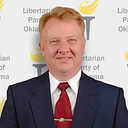How sleight of hand elected Brenda Reneau

Back in 2001 some folks in Guthrie wanted to have a debate about the Right-to-Work, but nobody from the official campaign against it was willing to show up. I had been making the argument that the federal laws that allow unions to have a monopoly of representation are the real problem and that passage of Right-to-Work would make this harder to address. Because of this, I was asked to take the no side for the debate, with Labor Commissioner Brenda Reneau arguing in favor of passage. It was an audience of maybe a couple dozen people, with a handful of firefighters present to support my side, but I’m pretty sure I confused rather than educated them. Nevertheless, it was a quite enjoyable experience as I would respond to a question with an attack on government overreach as exemplified by federal labor laws, and Brenda would respond to me by looking to her chief of staff, Jim Marshall, who would prompt her with an answer. From that time forward I referred to Jim as ‘Brenda Reneau’s brain.’
Reneau burst onto the Oklahoma political scene in 1994. As the director of and lobbyist for a construction trade group she caught the attention of some big wheels in the Republican Party as having the potential to defeat the incumbent Labor Commissioner, Dave Renfro. The only problem was that Reneau was registered as a Democrat. She did change her registration to the GOP on June 13, 1994, just a month before the filing period for anyone seeking elected office. Oklahoma requires candidates to be registered with their party of choice for six months prior to filing and Brenda obviously was not in compliance. However, the state election board is required to accept declarations of candidacy on their face. Only a person of standing, meaning some other person who has filed for the same office, can make a challenge.
Dave Renfro was under fire, with accusations that he was running the Labor Department in such an acrimonious manor that a significant number of employees were “on the verge of mutiny.” He drew three challengers for the Democrat primary, including Hamp Baker who had placed “Put Your Stamp on Hamp” signs all over the state. Another four individuals had put their names in the Labor Commission hat on the GOP side, State Senator Mike Fair, his friend and fellow active Republican Jim Marshall, a truck driver from Ponca City named Milton Stavinsky, and of course Brenda Reneau. With this much traffic, including a serious intraparty challenge and two weighty names on the other party’s side, Renfro gave little thought to the political neophyte, Reneau. If anyone but her GOP opponents at the time knew of her registration change problem they must have been curious as to why no one challenged her.
The state constitution of Oklahoma contains a provision that a legislator cannot leave office for another state position when the salary of that provision has been increased during that legislator’s term. The pay of the Labor Commissioner had been raised in the spring of 1994. As a sitting State Senator, Mike Fair would presumably be ineligible to accept the job. Having filed, he and his friend Jim Marshall who had also declared himself a candidate for the office, brought the issue to the state election board to decide if Fair could be a candidate. When the election board decided to remove Fair he held a press conference where he endorsed Brenda Reneau. Also present was his pal Jim Marshall, who, even though he would be on the primary ballot against her, also endorsed Reneau. Even Stavinsky decided to back Brenda a week before the primary election. He only got about 13% of the vote, but Marshall nearly upset the apple cart by getting 47% to Reneau’s 40%. Another 5,000 votes and he would have been the nominee. But if nobody gets a majority in a primary Oklahoma sends them to a runoff and also gives all candidates another chance to withdraw. Marshall did so, and Brenda was headed to November.
Renfro found his path much rockier, as neither former State Representative Karroll Rhoades, nor former Corporation Commissioner Hamp Baker, or even perennial candidate Virginia ‘Blue Jeans’ Jenner were willing to step aside. Baker won first place when about 1200 more Democrats chose to put their stamp on Hamp and the incumbent went into a runoff closely trailing. Most of Rhoads’ and Jenner’s supporters swung behind Renfro and he won handily, but the hand-picked newly converted Republican he faced in the general election was his undoing. In a year when Democrats won four statewide races and probably would have held the governorship if it hadn’t been for Wes Watkins, Brenda Reneau won by almost fifty thousand votes, a better showing than any other Republican seeking a statewide office.
Reneau went on to win reelection twice, serving as Labor Commissioner for twelve years. During her tenure she married and divorced, something she appears to have done a lot before entering public life, and in her second and third terms was charged with failing to come to work every day and turning over too much of the operation of the agency to subordinates. At one point after separating from her husband and suffering from health issues she went to court asking for temporary disability and claiming to be without a permanent residence. Despite this, in her last race in 2006 she only lost by 2626 votes out of over 900,000 cast. She is also remembered as creating a more cooperative atmosphere within the Labor Department. Jim Marshall would go on to serve as Mark Costello’s chief of Staff when Costello became Labor Commissioner, and is now with the Oklahoma Insurance Department.
